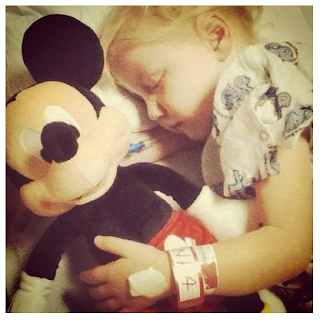Death, the enemy of life, comes to all. The old, the young, the innocent, the guilty, each of us will walk that path. The difficult part, for me, is watching people fight illness, especially children.
This morning, according to the Deseret News, "The McDonald family, who expected to spend the week celebrating the life of their daughter Mia on the trip granted her by the Make-A-Wish Foundation, found themselves instead in a hospital room in Tampa, Florida."
 |
| Mia just before her biopsy10/03/2012 |
I had the privilege to meet this beautiful family a while ago. I've been invited to play my music at the funeral on Saturday. I'm always humbled and honored at the opportunity to help send off the pure & meek through the medium of music.
With each death that occurs, many find comfort knowing there is life after death. From experience, I know this is true. There is life beyond the grave.
However, the separation of a mother and father from their child is tough love that God puts us through.
Life is not easy. In fact, it's really painful. There's a popular Mormon phrase, "I never said it would be easy, I only said it would be worth it." I'd rather my people say, "I never said it would be easy, I only said it would be hard, but if you endure it well, you will understand what it means to truly know joy, and understand how to experience, share, and live in the next world where I am."
There are those in the world who have no faith or relationship with God because they allow tragedy to harden their hearts or rebel from goodness to dull the pain. We want to numb our feelings. Even the great philosophers of Christianity like C.S. Lewis said in his book Grief Observed, after losing the love of his life to cancer, "Why is it that when I approach him at the door it seems as though he slams the door in my face." Some of us begin to philosophies that if God does exist, he simply doen't not care about me. Some wonder, "if he has favorites and are we just little chess pieces like portrayed in greek mythology?"
When we feel like the door is slammed in our face - we have to keep knocking. Pound on that door. Be persistent. Yet, be humble and submissive, willing to listen. We have to be submissive enough to continue to inquire of the Lord, especially when things are going well in our lives.
I know in my newly transplant heart just as I did in the one that died, that God is our loving Heavenly Father, the creator who organized the universe and is omniscient. Never quit on Him. He is not an umpire looking for failure. He is more like the Father in the stands cheering us on. He is teaching us compassion, faith, hope, and eternal principles of love that we'll take with us into the next life.
Most of us can agree that humans have primitive understanding of reality and truth, especially with our massive telescopes and knowledge of the sciences. If I can call a friend from a device that sends a message directly to space and some satellite sends it back to my friend on their device at that very moment, how can we doubt the ability to communicate with God, who is our friend and Father.
I am sad, frustrated, and discouraged when someone I love passes on into the next world, even though I believe they are surrounded by loved ones who have gone beyond. Belief in God gives us hope beyond this mortal world. It's not a bad way to live.
Overall, there is a parable that explains life in simple parable by Bruce R. McConkie. I hope it helps.
Imagine A man walking along the road happens to fall into a pit so deep and dark that he cannot climb to the surface and regain his freedom. How can he save himself from his predicament? Not by any exertions on his part, for there is no means of escape in the pit. He calls for help and some kindly disposed soul, hearing his cries for relief, hastens to his assistance and by lowering a ladder, gives to him the means by which he may climb again to the surface of the earth.
This was precisely the condition that Adam placed himself and his posterity in, when he partook of the forbidden fruit. All being together in the pit, none could gain the surface and relieve the others. The pit was banishment from the presence of the Lord and temporal death, the dissolution of the body. And all being subject to death, none could provide the means of escape.
Therefore, in his infinite mercy, the Father heard the cries of his children and sent his Only Begotten Son, who was not subject to death nor to sin, to provide the means of escape. This he did through his infinite atonement and the everlasting gospel (Doctrines of Salvation, comp. Bruce R. McConkie, 3 vols. [1954–56], 1:126–27).
Here is Mia and her family. If you would like to help offset some of the costs associated with this sad new please visit: http://www.giveforward.com/achangeofheart










